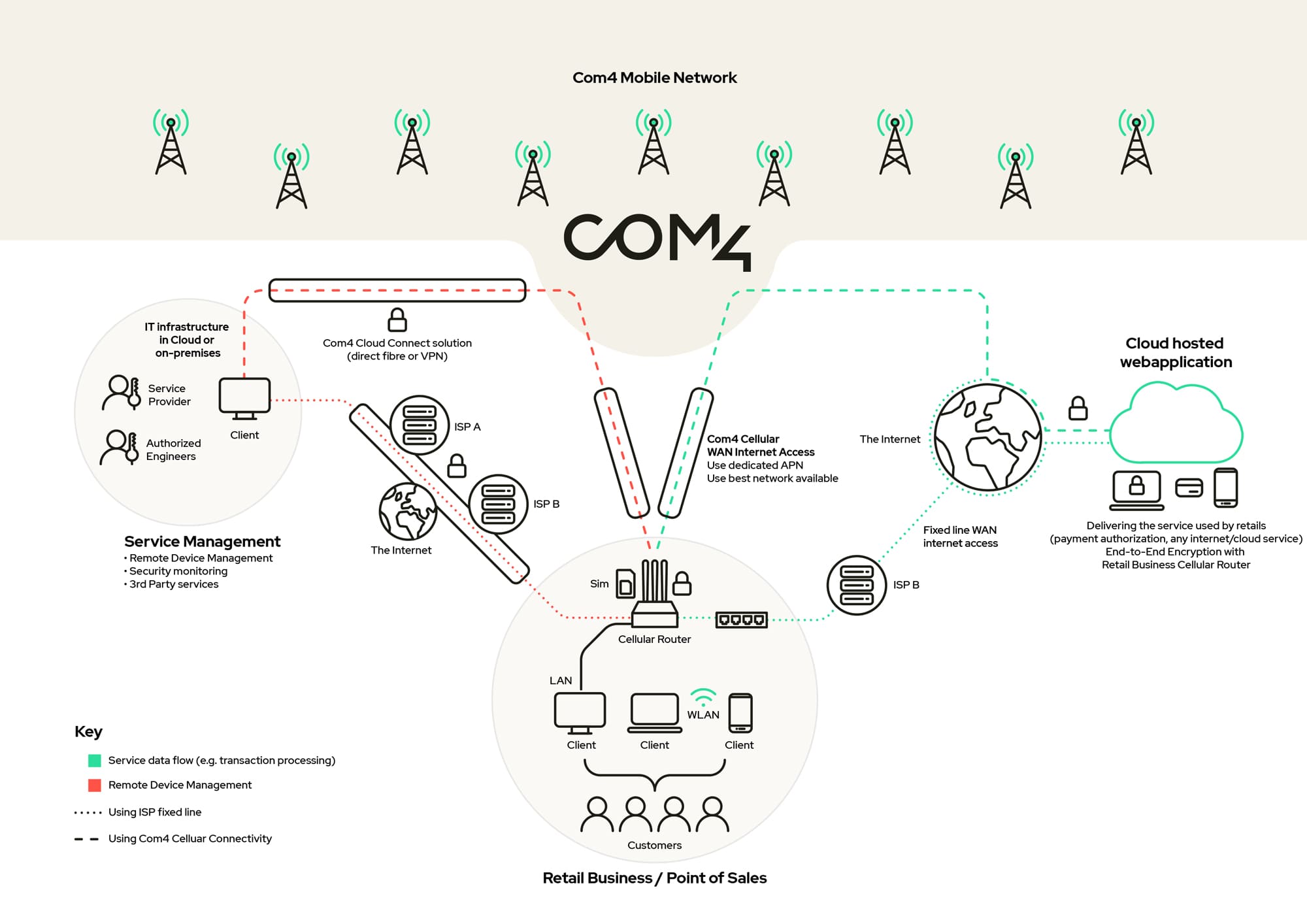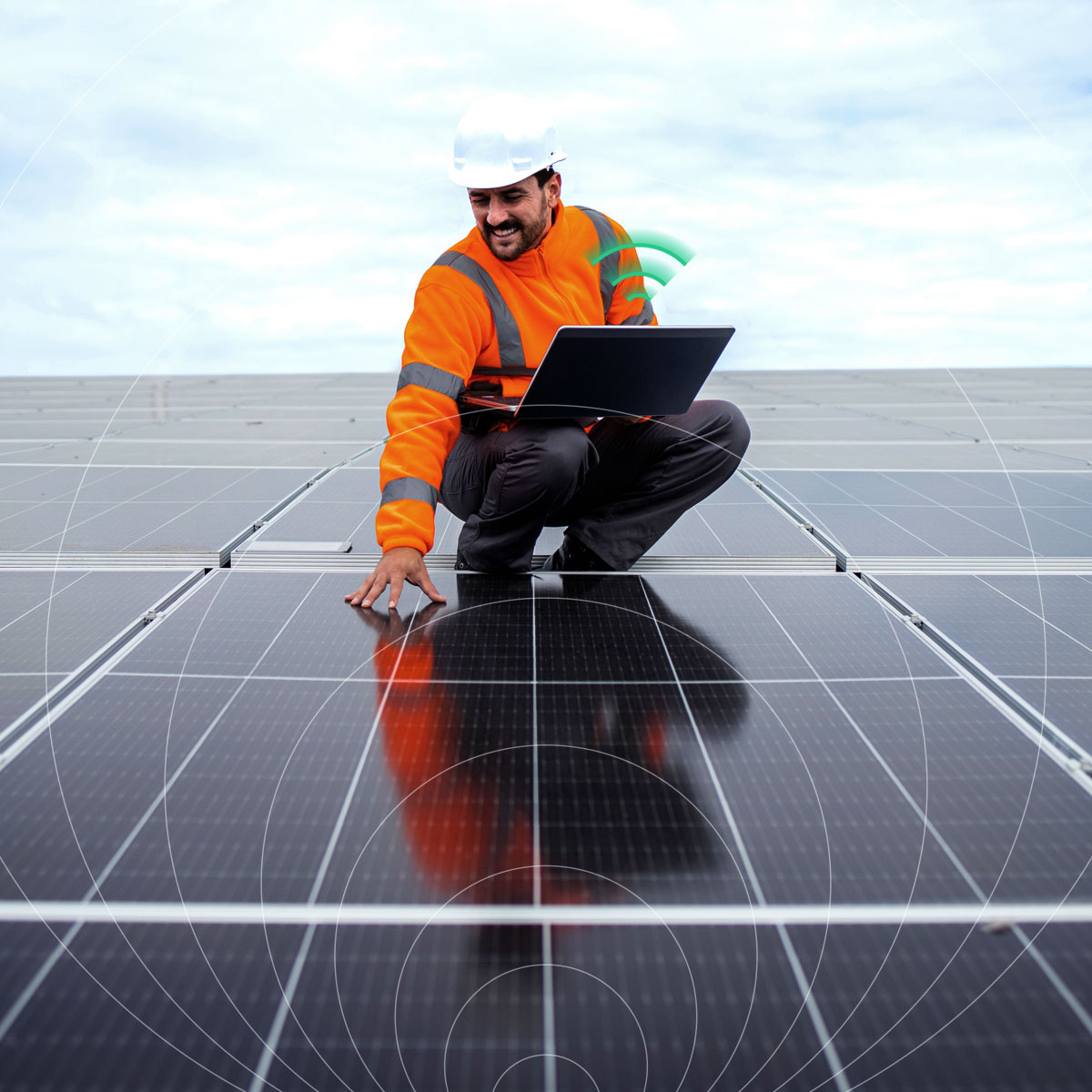Today, retailers are harnessing cutting-edge technologies like cloud computing, mobile devices, RFID, and beacons to offer connected retail experiences and elevate the shopping journey for their customers. A staggering 70% of retailers believe that IoT will fundamentally reshape their business strategies in the future.
According to MarketsandMarkets, the global Internet of Things (IoT) in retail market is expected to grow from USD 14.5 billion in 2020 to USD 35.5 billion by 2025.If you're interested in integrating IoT solutions into your retail business and wish to explore the capabilities that drive upcoming trends and significant benefits, this article is tailor-made for you.
Here's a glimpse of what we'll delve into:
-
The role of IoT in the retail market
-
Benefits of IoT in retail
-
The application of IoT in the retail industry
-
IoT trends in retail
-
How Com4 empowers retailers with IoT connectivity solutions
The role of IoT in the retail market
IoT serves as a cornerstone in the retail market, revolutionizing the way businesses operate. It encompasses a network of physical devices, objects, and spaces embedded with advanced technologies such as Bluetooth beacons, sensors, GPS, and RFID. This network empowers brands to monitor the location, condition, and movement of their assets and inventory in real time, from any location. Retailers achieve unparalleled visibility by establishing seamless connections and exchanging data with various systems and devices over the internet.
The following are two of the most prevalent IoT applications in the retail industry:
Data Collection and Sharing
Devices equipped with IoT sensors track product lifecycles and shopping patterns, capturing diverse data, including environmental and equipment metrics, asset performance, stock levels, and more. This data can be stored, transformed, and analyzed using sophisticated algorithms to extract meaningful insights, optimizing day-to-day operations.
Smart shelves and automated restocking
A large retail chain equips store shelves with IoT weight sensors and RFID tags connected via cellular networks. When stock levels drop below a set threshold, the system automatically alerts staff or triggers a restock order, ensuring popular items are always available and improving customer satisfaction.
Connected cold storage for food safety
A grocery retailer uses IoT connected temperature and humidity sensors in refrigerators and storage rooms. The sensors send real time data to a central dashboard, and alerts are triggered if temperatures rise above safe limits, preventing spoilage, reducing waste, and ensuring food safety compliance.
Process Automation
IoT-enabled connected stores and devices can be partially or fully automated, introducing efficiency, sustainability, and resilience to retail operations and processes. Retail automation accelerates supply chain operations, inventory management, order fulfillment, and checkout procedures, enhancing overall operational efficiency.
Smart fitting rooms
A clothing retailer installs IoT-enabled mirrors and RFID sensors in fitting rooms. When a customer brings in an item, the mirror automatically displays product details, available sizes, and styling suggestions. Staff are notified instantly if a different size or color is requested, creating a smoother and more personalized shopping experience.
Energy-efficient store management
A supermarket chain uses IoT sensors to monitor lighting, temperature, and energy consumption across multiple locations. The system adjusts conditions automatically based on occupancy and time of day, reducing energy costs while maintaining a comfortable shopping environment.
Benefits of IoT in retail
The adoption of IoT in the retail industry is gaining significant momentum, driven by numerous advantages. IoT technology facilitates the development of new business models, provides deep insights into consumer behavior, streamlines processes, and boosts employee productivity. Let's delve into the key benefits that result from implementing IoT applications in the retail sector.
Streamlined supply chain management
Connected sensors provide a continuous stream of real-time data, enabling proactive identification of potential bottlenecks, contingency planning, route optimization, and accelerated product delivery. Manufacturers, suppliers, and distribution centers can optimize shipping and handling times, ensuring swift delivery to vendors and consumers.
Enhanced customer experience
IoT capabilities and machine learning algorithms enable precise assessment of consumer data, leading to personalized shopping experiences.
Optimized store layouts
Aisle analytics software, coupled with sensors, leverages IoT technology to enhance in-store layouts. This optimization contributes to improved customer behavior analysis. The data collected helps retailers understand buyer journeys, identify confused and impatient shoppers, and determine the reasons for abandoned carts. IoT retail analytics and machine-learning-driven demand forecasting aid in anticipating demand, supply, customer retention ratios, and making proactive adjustments to the shopping environment.
Efficient inventory management
RFID chips, beacons, and sensors seamlessly synchronize assets and inventory with data centers. Smart price tags and digital displays, integrated with image analytics capabilities, enhance control and order stock levels, including expiration dates, in both the warehouse and on the front shelves.
The application of IoT in the retail industry
Modern retailers leverage diverse IoT devices, platforms, and applications to navigate the evolving retail landscape. Let's explore some concrete use cases that demonstrate how retailers harness the potential of IoT to revolutionize the retail experience:
Smart shelves
Retailers use IoT-enabled smart shelves to track items and ensure they're never out of stock. Weight sensors and RFID tags on display and stock shelves streamline inventory processes, leading to cost-effective and precise management. Smart shelves help in preventing product misplacement and can even detect in-store theft, reducing the need for additional security measures.
Optimized product placement
Store managers utilize insights gathered from IoT sensors and video analytics to identify premium store areas. They can test the placement of different product types in various spots to determine the most profitable layout. Implementing self-learning analytics algorithms assists store owners in delivering a seamless shopping experience.
Buyer behavior tracking
Occupancy sensors provide vital insights into store traffic patterns and retention times in premium product areas. This data enables better planning of in-store merchandising and guided marketing through effective digital display ads, calculated space allocation, and aisle layouts. Retailers can also leverage this data to optimize customer service by managing checkout wait times.
Seamless in-store navigation
IoT-powered sensor-based lighting, temperature controls, security measures, stock monitoring, indoor air quality (IAQ), and point-of-sale queuing assistance enhance the in-store experience for shoppers. Retailers can leverage the data extracted and analyzed from IoT solutions for compliance monitoring across various parameters, including lighting schedules, energy consumption, refrigeration zones, warehousing, HVAC equipment performance, and maintenance plans.
Checkout automation
IoT technologies, such as motion-activated cameras, beacons, and shelf-tracking tags, enable fully automated, cashier-less in-store shopping experiences. Shoppers can enter the store, select the items they want, make online payments, receive digital receipts on their smartphones, and leave without the need for manual checkout.
On-Site sensors for repairs & maintenance
Retailers can install commercial sensors in food storage facilities, parking sites, and warehouses to monitor light, humidity, temperature, and air quality. These sensors trigger instant alerts if any critical aspect deviates from the desired range. Retailers can generate reports to track trends and fluctuations over time, enabling automated safety checks.
Cold chain monitoring
IoT-enabled environmental sensors continuously track temperature, humidity, and other ambient conditions inside food storage facilities, cargo vessels, and delivery vehicles. This ensures products remain within safe temperature ranges throughout the entire supply chain, keeping food fresh and minimizing waste. Real-time data helps identify deviations instantly — preventing costly spoilage and maintaining compliance with safety regulations.
To explore how IoT is transforming food logistics and storage from farm to fork, see our full article on IoT in the Food Industry.
%203.png?width=2240&height=1260&name=Untitled%20design%20(6)%203.png)
IoT trends in retail
The retail sector is witnessing significant IoT-related trends, shaping the future of the industry. According to Research & Markets Analysis:
-The demand for IoT in retail is rapidly increasing, with the global market projected to reach €177.90 billion by 2031, growing at a CAGR of 20.3 % from 2022 to 2031, according to Allied Market Research.
-The optimization and automation of the supply chain are identified as the primary factors driving IoT adoption.
- Connectivity technologies, including digital signage, top-tier displays, beacons, and price displays, empower brands to access large volumes of data on customer activity during in-store shopping.
Common challenges in retail IoT and their solutions
Retailers face several common challenges when implementing IoT solutions, including unreliable connectivity across multiple store locations, data security concerns, complex device management, and integration issues with existing systems. These hurdles can limit efficiency and data driven decision making. By partnering with a trusted IoT connectivity provider, retailers can ensure reliable and secure coverage, protect sensitive data with end to end encryption, gain full visibility and control through centralized management platforms, and integrate seamlessly with existing infrastructure, enabling smarter operations and improved customer experiences.
|
Challenge |
Solution |
|
Unstable network performance across locations |
Multi-network SIMs that automatically switch to the best available network |
|
Managing thousands of connected devices |
Centralised management for SIMs and devices with remote provisioning |
|
High roaming costs for international operations |
Global IoT SIMs with transparent tariffs and pre-negotiated rates |
|
Security and unauthorised access |
Private APNs, VPNs and device authentication for controlled access |
|
Limited internal IoT expertise |
Managed connectivity and technical support from a trusted provider |
How Com4 empowers retailers with IoT connectivity solutions
As a leading IoT connectivity provider, Com4 is committed to empowering retailers with cutting-edge IoT solutions tailored to their unique needs. We partner with retailers, ranging from startups to large corporations, to deliver custom IoT app development services and solutions. Our expertise spans across a wide array of industry use cases, ensuring that retailers can leverage the full potential of IoT to enhance their operations and customer engagement.

For example, we recently collaborated with a logistics company, enabling them to seamlessly manage their supply chain network with an IoT-enabled fleet management solution. This solution provided real-time insights and optimization capabilities, leading to increased operational efficiency.
In today's dynamic retail landscape, the integration of IoT solutions is essential for staying competitive and providing exceptional customer experiences. From streamlined supply chain management to enhanced customer engagement, the benefits of IoT in the retail industry are vast. Retailers of all sizes can leverage IoT to drive operational excellence and capitalize on digital transformation opportunities.
If you're ready to implement IoT within your retail store(s) and require a seasoned team for consultation, development, and management of custom IoT-enabled intelligent retail solutions, Com4 is here to assist. Our dedicated professionals are passionate about helping you navigate the IoT landscape, and we're committed to delivering results that empower your business.
Security and compliance in Internet of Things for retail
With the rapid adoption of IoT in retail, data protection and compliance have become crucial. Regulations such as the General Data Protection Regulation (GDPR) in Europe and the California Consumer Privacy Act (CCPA) in the United States set clear requirements for how customer and operational data must be collected, processed, and stored. Retailers using IoT devices must ensure that their systems and partners meet these standards to maintain customer trust and avoid legal risks.
Retailers should ensure:
-
Clear consent is obtained before collecting customer data.
-
Data is encrypted during transmission and storage.
-
Access to IoT systems and data is restricted and monitored.
-
All IoT vendors and partners comply with relevant regional regulations.
-
Regular audits are conducted to identify and fix vulnerabilities.
Explore the possibilities of IoT with Com4
Contact us today to embark on a journey of IoT-driven innovation for your retail business. Together, we can create a future where connectivity and efficiency redefine the retail experience.
FAQs on IoT in retail connectivity and solutions
How is IoT used in the retail industry?
IoT technology is revolutionising the retail industry by connecting devices such as sensors, shelves, scanners, and cameras to collect and share real time data. Retailers use these connected systems to monitor inventory levels, store conditions, and customer behaviour, allowing them to automate restocking, prevent product loss, and improve operational efficiency. With reliable and secure IoT connectivity from Com4, retailers can seamlessly integrate thousands of devices across multiple locations and ensure uninterrupted data flow between stores, warehouses, and headquarters.
How does IoT improve customer experience in retail?
IoT improves the in store experience by making shopping faster, more convenient, and more personalised. Connected point of sale systems and smart shelves reduce waiting times and ensure products are always available. Environmental sensors maintain ideal lighting, temperature, and air quality, while customer data enables tailored promotions and offers. With Com4’s IoT connectivity, retailers can deliver real time, data driven experiences that boost customer satisfaction and brand loyalty.
What type of connectivity does retail IoT need?
For IoT in retail to work effectively, devices need constant, secure, and high quality connectivity. From smart shelves and payment terminals to cold chain monitoring and delivery tracking, each device relies on a stable data connection. Com4 provides multi network cellular coverage that keeps devices connected even in challenging environments, along with private APNs and VPNs to protect sensitive data and ensure network reliability. This gives retailers complete control, visibility, and security across their IoT ecosystem.
Is IoT in retail secure and compliant?
Security and compliance are essential for IoT in retail, where connected systems handle customer and operational data. When retailers use encrypted connections, private networks, and strong authentication, IoT solutions become both safe and reliable. Com4’s private APN, VPN, and SIM management platform provide an additional layer of security, ensuring only authorised devices communicate on the network. These measures support compliance with global data protection regulations such as GDPR and CCPA, keeping customer trust and data integrity intact.
What is the future of IoT in retail?
The future of IoT in retail lies in combining 5G, artificial intelligence (AI), and automation to create smarter and more efficient stores. Faster data transfer and lower latency will enable advanced applications such as predictive analytics, real time inventory tracking, and frictionless checkout systems. With Com4’s future ready IoT connectivity solutions, retailers can scale their digital transformation, enhance sustainability, and stay ahead in an increasingly data driven retail landscape.

 CASE STUDY
CASE STUDY
.png?width=720&height=720&name=Untitled%20design%20(4).png)



.jpg)

.jpg)